What Working Remotely is Really Like + 7 Tips for Working From Home
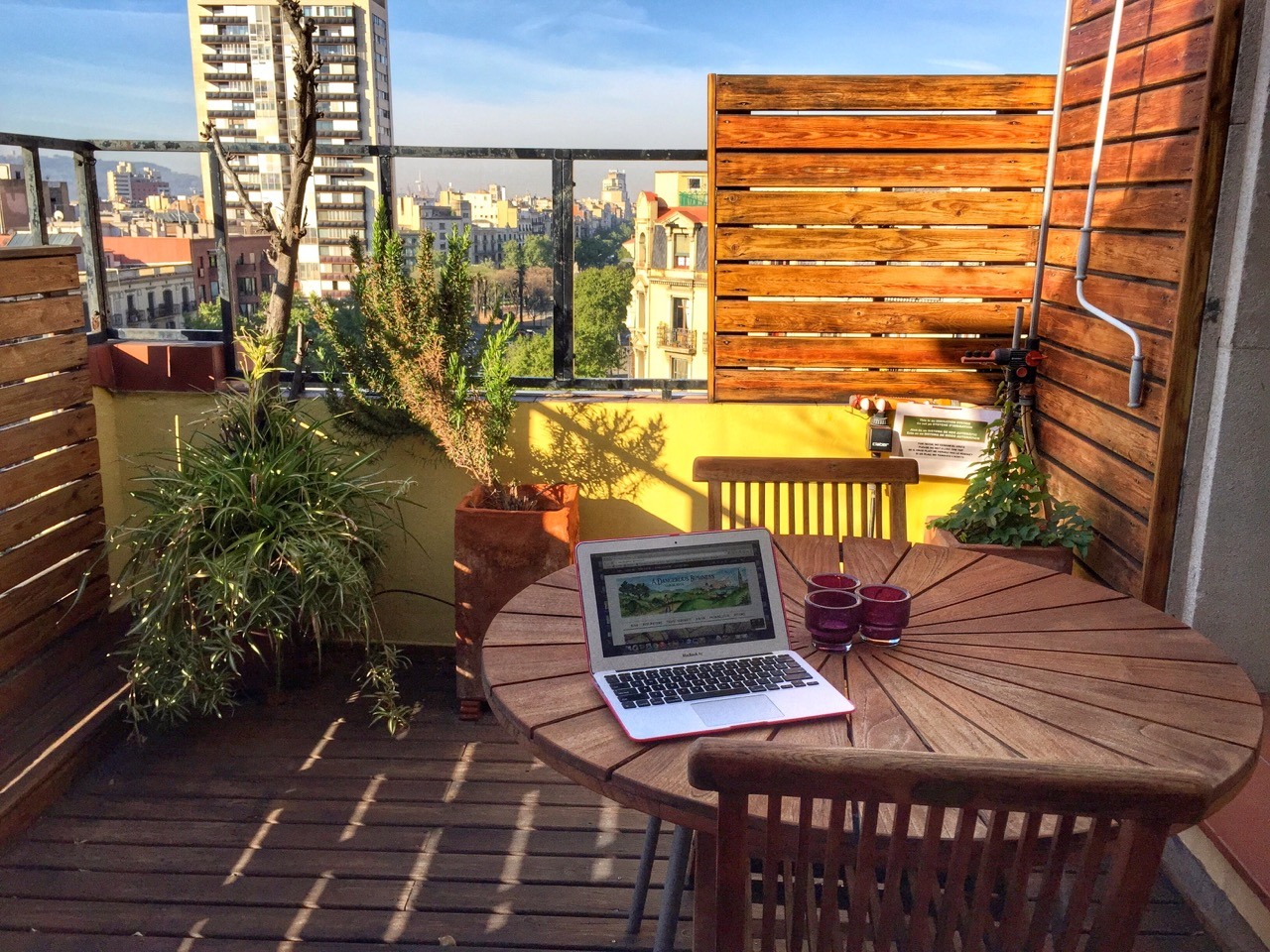
Stopping by because you're now working from home for the first time thanks to the COVID-19 coronavirus? Check out the realities of working remotely, and scroll further down for my top tips for staying productive when you're working from home!
You've seen the photos – someone working on a laptop in a hammock, or on a beach, or on a hotel balcony with a killer view (yup, I'm guilty of this last one!).
You see these photos and assume that it's not a lifestyle that you could have for yourself; this is surely the lifestyle of someone with more freedom and less responsibility than you.
But what if I told you that wasn't necessarily true?
Twenty years ago, the concept of “remote work” wasn't even really a thing. People went to an office or out into the field to do their jobs. Hardly anyone worked from home. And, checking in for daily meetings from some remote corner of the world? Unheard of.

But, now, with the proliferation of the internet, many more jobs can be done outside the typical office environment than ever before. Telecommuting has been called “the future of work,” and the growth in remote work has been almost exponential (it's increased by 44% in the last 5 years alone).
So some curiosity about what “working remotely” really means is natural.
The Realities of Working Remotely
In some cases, a person might be able to work remotely (or from home) a couple times per month, or maybe even one or two days per week. That IS remote work – but not necessarily the type of telecommuting I want to talk about here. I want to tell you what working 100% remote is really like. What it's like to be “location independent” and make a living from wherever you happen to be in the world.
First of all, there are a couple different kinds of “remote work.”
- Freelancing – When you're a freelancer, it usually means that you're hired for projects – sometimes one-off, sometimes on an ongoing basis – and your workload and salary can vary greatly month to month. For example, I used to freelance frequently as a writer for a few different travel websites, but would also pick up one-off writing or social media gigs when I could get them.
- Contract work – When you're working on a contract, it means you can count on a certain amount of work for a set period of time. For example, when I was working for a software startup back in 2014/15, I was on a contract to work at least 20 hours per week. There's still usually some freedom with contract work when it comes to how/when you put in your hours, but it's generally steadier than straight-up freelance work.
- Full-time work-from-home – This type of remote work is more regimented; more like a full-time job. You have set work hours every day – you're just doing that work from your home rather than a traditional office.
These days, I'm a full-time blogger. While I used to focus on freelance and contract work, I have even more freedom now because my blog itself makes me a full-time income. This means I can take on as much (or as little) work as I want, based on what my travel plans look like.
And while I do have a home base in Ohio, I could conceivably be traveling full-time or living abroad and still be able to do what I do.
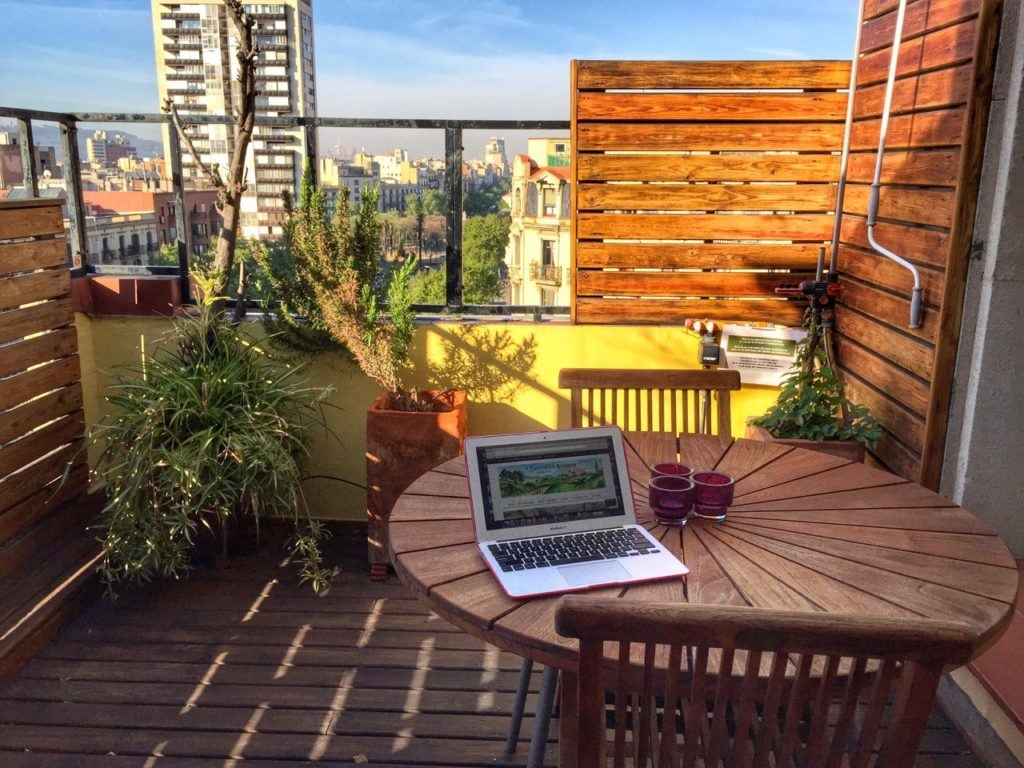
What kind of things can you do remotely, you ask? Well, things like:
- Writing
- Editing
- Transcribing
- Social media management
- Customer service
- Web/graphic design
- Content/email marketing
- Coaching/consulting
- Project management
Basically any job that you can do 100% from a laptop is something that can be done remotely.
Why working remotely is awesome
If working remotely sounds pretty great so far, that's probably because it is! Or, at least it can be. Having a location-independent lifestyle is great for many reasons.
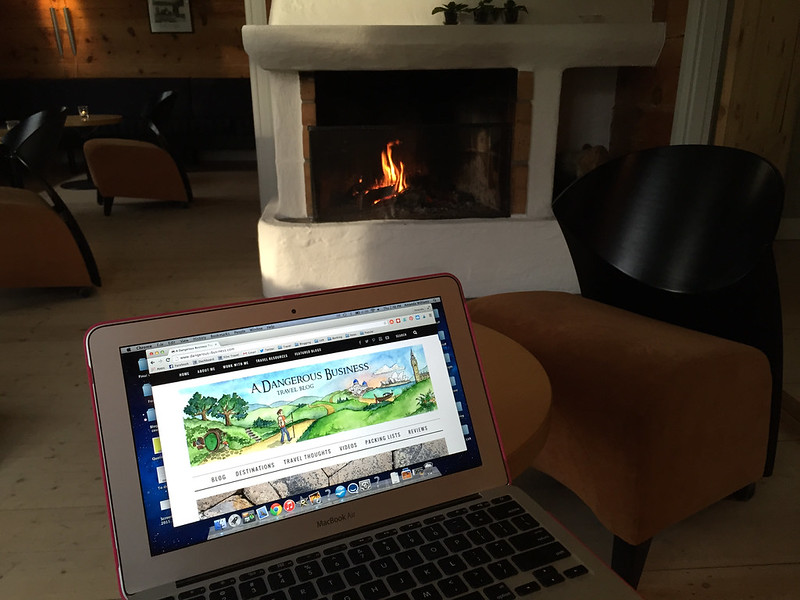
For example:
1. You can make your own hours
Especially when you're a freelancer working remotely, you often have the freedom to set your own working hours. Not a morning person? No problem – start your work day at noon and work into the evening. Want to take the afternoon off to go to the beach or to a museum? You can do that, too.
As a blogger, my work load varies from week to week (and sometimes from day to day!). By planning ahead, I can often fit the bulk of my work into a few days if I know I want to dedicate some time to something else at some point during the week.
Even when I was working on a contract, I could usually plan my work around my schedule – even when I was traveling.
2. You can work from anywhere
The biggest upside to location independence and working remotely is, of course, the freedom to work from anywhere you want. All you really need is a laptop and a decent wifi connection.
I base myself out of Ohio, and therefore spend a lot of time working from my home (I like to joke about my daily “commute” from the bedroom to the living room or office). But when I travel, I usually take my work with me.
I've worked from balconies in Spain, terraces in the Greek Islands, cafes in New Zealand, the beach in Thailand, and while nestled up by the fire in Norway. The freedom to work AND travel is paramount to a travel blogger like me, but is a bonus to other types of remote workers, too.

Why remote work is challenging
Even though the freedom to work from anywhere and set your own hours is appealing, working remotely (especially as a freelancer) doesn't come without its challenges.
1. Self-accountability
When you're a freelancer or a contractor, it often means that you are your own boss. Sure, you might be hired to do specific work for a specific client and given a deadline, but it's ultimately up to YOU (and no one else) to make sure the work gets done on time.
There's a lot of self-accountability involved with working remotely, since you don't have a boss or coworkers around to keep tabs on you.
2. More distractions
Working from a co-working space is probably the best idea for most remote workers since it acts like your “office” – however it's not always feasible to pay for a desk somewhere. If you travel a lot like me, it's easier to work from home or from wherever you are on the road.
But the freedom to work from anywhere also comes with distractions. At home, there's always the TV, my cat, and every social media site out there tempting me into distraction. When I'm traveling, there's of course always the pull to be out exploring instead of working. If you're working remotely, you'll have to learn how to deal with the distractions in a way that still allows you to be productive.

3. You may not always have a steady paycheck
One of the biggest challenges for me as a blogger/freelancer is never knowing exactly how much money I'll be making each month. I often have to hustle for work, and the uncertainty of it all has seriously stressed me out in the past. This is minimized if you take on more contract work, or if you do your “normal” job from home, of course. But it's still something to think about.
I've worked hard in the past few years, though, to diversify my income streams so that I'm not relying on one job for all of my income. But diversifying takes time, and until you hit the perfect balance you may not have a steady paycheck to rely on each month.
RELATED: How I Make Money as a Blogger
4. It can be hard to stop working
Lastly, another huge challenge that I face while working remotely is striking a balance between work and play. It's easier when I'm traveling, since exploring a new destination trumps sitting in front of a laptop just about any day. But when I'm at home, I struggle. I tend to work better in the afternoons/evenings, but this means that I'm often opening up my laptop when a new work idea strikes me well into the night.
It's something I don't usually think twice about since I LOVE what I do, but I do realize that I don't have the healthiest work/life balance. Some days I literally have to force myself to close my laptop and put away my phone and do something that doesn't have anything to do with work. This is something I'm constantly working on!
Is remote work worth it?
I've talked to plenty of people who don't think working remotely or being a freelancer would be a good fit for them. And that's totally fair – being your own boss, setting your own hours, and dealing with salary uncertainty isn't for everyone. There are also some days where I definitely do miss having coworkers and friends in an office, too.
But, at the end of the day, this type of lifestyle IS for me. I love being able to plan a trip whenever I want, and I love that I can write a blog post or manage a social media account from the other side of the globe.
Even though the challenges seem… well, challenging, the pros of working remotely far outweigh the cons in my eyes.
7 tips for working from home
Whether you're new to remote work or an old hand at it, you still need to treat it like work – meaning you need to know what you need to do in order to stay as productive as possible.
Here are my top tips for working from home that will help you be both comfortable and productive!
1. Know your work style
If you know you work best in the afternoons instead of the mornings, don't fight it. This is the case for me, so I usually spend my mornings doing things like handling my email inbox and checking on social media. I save the real “work” (in my case, writing and editing) for the afternoon.
If you know you need a standardized routine in order to get things done, work on establishing one that can be adapted no matter where you'll be working from. (And if you're switching from working in a regular office setting to working at home, try to replicate your usual office routine as you ease into remote work.)
2. Stay organized
Whether you have a boss to answer to or run a one-person show like I do, staying organized and on top of your to-do list is so incredibly important. I stay best organized when I can make lists and set deadlines, and then hold myself accountable to them.
My favorite apps for keeping track of tasks include CoSchedule (for my editorial calendar), Trello, and my Google Calendar. Other good organizational tools to check out include Todoist and Notion.
3. Create an ideal work environment
Because I've been doing this for a while, I can essentially work anywhere that has good wifi. But obviously things like a comfortable place to sit and some natural light help, too. Make sure your work environment works for you, whether your necessities are as simple as a couch and a laptop, or as complex as multiple monitors and ergonomic gadgets.

4. Know how to handle distractions
There are plenty of handy apps out these these days to help you stay focused. My friend Kate introduced me to the Be Focused app, a free app for Mac that helps you work in 25-minute increments of time. Other apps that help you keep track of your time include RescueTime and Toggl.
5. Set goals
Whether these are daily, weekly, quarterly, or yearly, goal-setting is super important for remote workers – especially if you're also running your own business and not just working for someone else.
In my line of work, I set loose goals for things like traffic, income, and even how many blog posts I want to publish every month. (And a bonus tip: Celebrate reaching said goals!)
6. Know when to stop
It's easy to get wrapped up in work when you don't have set hours or anybody to answer to on a daily basis. Because of this, it's extra important to know when to set the laptop aside. If it helps, set yourself actual working hours every day with established break times so you can get into a routine
(And yes, you should absolutely work in regular breaks, even when you're working from home.)
7. Learn how to say no
As a freelancer especially, many people will expect a lot from you. Often all at once. When I first started working remotely, I would jump at literally any chance to make extra money. But that's how you get burnt out as a freelancer. When working for yourself, you HAVE to learn how to say no, for both your mental and physical well-being.
So what's your take on working remotely? Is it something you'd ever want to do?
Pin it for later:

Amanda Williams is the award-winning blogger behind A Dangerous Business Travel Blog. She has traveled to more than 60 countries on 6 continents from her home base in Ohio, specializing in experiential and thoughtful travel through the US, Europe, and rest of the world. Amanda only shares tips based on her personal experiences and places she's actually traveled!


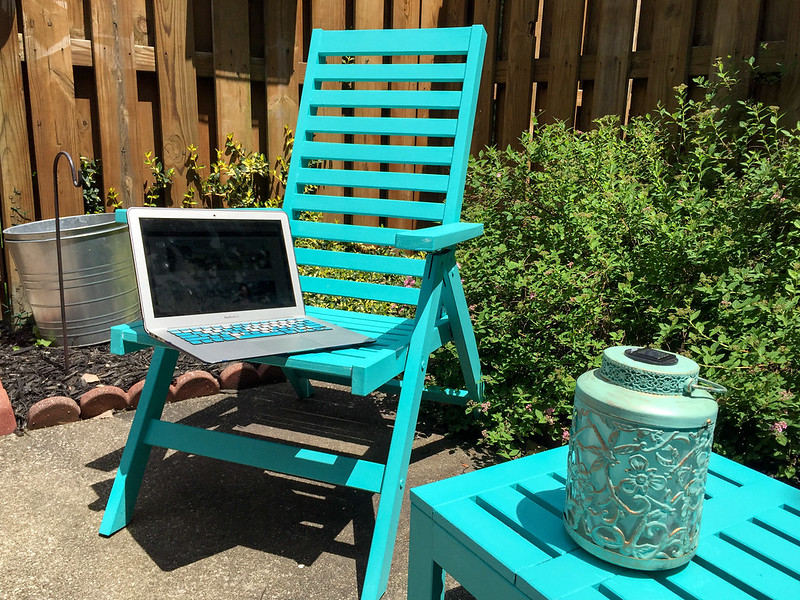
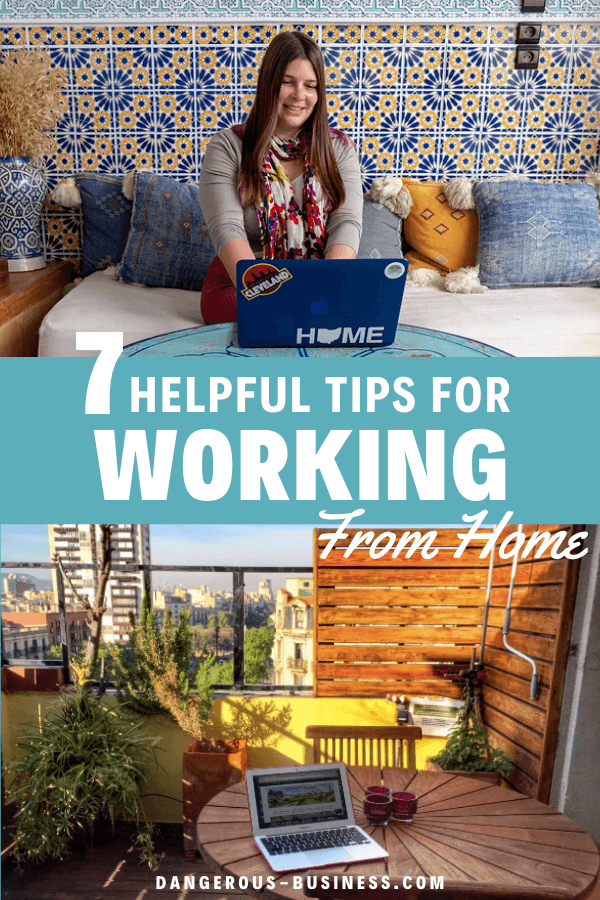










I definitely don’t seeing myself being location independent at any point in the near future, as I have terrible self motivation when it comes to that kind of thing and I just enjoy the act of going to work and having coworkers. But one day I plan on having kids, and most likely being a single parent, would love to be able to stay at home with them all the time, so I would definitely consider making the switch then!
Very good logic there, Ijana!
Hi Amanda,
Felt great to hear about the nuances about remote working. Feels like a dream job 🙂
It definitely can be, so long as you’re willing to take on the challenges!
Hi Amanda, you talked about the different types of work that people do remotely, including freelancing or contracting, but both of those require being hired by someone to do work for them. There is also the type of work where you own your own business and answer to no one but yourself! Tom and I started developing apps when we started traveling five years ago, and our two-person company is still chugging away. I would also add “patchy internet” to the hardship list, it feels like is our number one issue with running our own business while traveling full time!
Great example, Jenny! Working 100% for yourself and starting a new business is always an option, too! And you’re also correct that bad Internet can definitely be a challenge – there’s nothing worse than wanting to get work done and you can’t!
Remote Year is another organization like Wanderos. I didn’t know there was more then one! (but of course there is).
I am one of the few people that could never work remotely full time. I would get nothing done. When I am at work, I work, and when I am at home, work is not on my mind. I have never even put my work email on my phone (and I hope I never do). I am an anxious person in general and if I had to think about work at home and all the time, always feeling like I am not doing enough, I would fall apart in no time.
That’s totally understandable! Working remotely definitely isn’t for everyone. I have a couple friends who feel the same as you do, and there’s nothing wrong with that! 🙂
Very helpful tips and Wanderos sounds like an interesting concept. I’ll definitely check it out. Thanks for sharing, Amanda!
Happy travels 🙂
There are other companies doing similar things, too – working remotely is kind of the “it” way to work right now!
I’ll bet whoever started Wonderos is making a fortune! It sounds interesting, especially if they provided any sort of head-hunting service…then I could see forking over $2k for the experience, but they don’t:
“Does Wanderos provide the jobs?
No, each traveler will be responsible for their own remote employment.
Wanderos is simply the travel, accommodations, logistics, and community organizer.”
A rather expensive organizer! Maybe you can find the work through the other people you would meet, but that’s a big if…
I think it depends on where you live and work normally. If you’re used to paying $500 per month to live in Chiang Mai, then spending $2100 per month to live and travel abroad would definitely sound like a fortune. But that amount isn’t really far off what I pay to live/work in Ohio each month. And if you compare that to living in London or New York? Then it’s a steal!
Ahh the life of a freelancer and travel blogger….
Haha you know it! But I don’t think I’d trade it for anything. 🙂
This is such a great post and you really hit a lot of nails on the head with it. I’ve been thinking about this very topic for a while now and I’m constantly going back and forth with it. I think for me, I really would love to work for myself. I love the idea of being my own boss (and I’d say I’m a self-accountable person, so no problem there), having the freedom to work where and how I want and the idea of not being ‘tied down’. But I feel like I really need to have a steady and dependable paycheck too and the uncertainty would cause my already high anxiety to skyrocket haha. I guess I have to find some sort of balance… I want my work life to have variety but I probably need some sort of structure.
Ugh! Sorry for venting and thinking out loud haha. Thanks for this great post! 🙂
Glad you liked it, Ella! When I tried to jump straight into freelancing a couple years ago, it was too much. It was too stressful, and I didn’t like not knowing how much I would make each month. So I got a part-time remote job that at least came with set pay each month. And it was a perfect way to ease into this kind of lifestyle.
Exactly. That’s why I prefer to work remotely than to work in an office.
I definitely prefer it, too. I can’t imagine giving up the freedom now that I have it!
Reading this had me thinking of a productive space company named cove in downtown DC. You get all the amentities of an office (wi-fi, printing & scanning, coffee, etc) without going to an actual office. Membership plans are available based upon your needs. For someone who works remotely, this looks like an option.
Cove also has a Boston location and looks to expand to other US cities.
That sounds great! There are co-working spaces like that popping up in most major cities now. In fact, there’s a small one near where I live, too. If I didn’t travel so often, I would definitely consider renting desk space to try it out. Being able to chat with other people during the day is something I miss sometimes when I’m working from home!
Well said!
I’m sure you can relate, Caroline!
What a great summary! Thanks for sharing your honest thoughts about this topic! We are constantly thinking and discussing about it lately… 😀 We are trying to slowly move to the contract work / freelancing direction, but we are quite hesitant sometimes. We are eager to have more freedom and to be our own bosses, but uncertainty just terrifies us sometimes. So we are just collecting our strength (and some back-up money 🙂 ) for that big jump what giving up our full-time job would mean.
You are so right that this thing is not for everyone – and our big question is to find out which group we are in. We’ll see when we finally jump. 😀
It sounds like you’re definitely going about it the right way – working up to freelancing full time and building up some back-up savings is super smart!
Really great post – thanks so much for sharing your tip and tricks (and some of the downfalls) of working remotely!
Thanks, Kate! When it comes to talking about an “alternative” lifestyle like living location-independent, I think it’s always worth it to address both the good AND bad. (Though personally I love working remotely, and don’t think I could ever go back to a traditional office job!)
Working from home IS awesome – especially when you work full time and have young kiddos. Even just one day a week at home helps keep the chaos (and chores) in check. Great post, thanks for sharing – I’ll certainly have to check out Wanderos to see what it’s all about.
I don’t have any kiddos, but I can definitely see how working from home even just a couple days a week would be great for a parent.
Wanderos sounds very cool! I’m fortunate that I’m able to WFH a couple days per week, but I’d love to be able to work remotely from different countries to squeeze in more travels!
When you can completely work from home (or from wherever you are), it definitely makes it easy to squeeze in more travels! But hey, getting to work from home a couple days per week is nice, too!